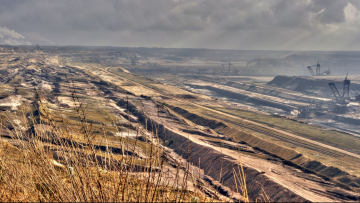German energy giant RWE withdraws from Bulgarian nuclear power plant
Heffa Schücking, Tel: (49)-160-96761436 Jan Haverkamp, , Tel: (420) 603 569 243
Heffa Schücking, Tel: (49)-160-96761436 Jan Haverkamp, , Tel: (420) 603 569 243
In a letter to the Bulgarian Energy holding, the German company RWE today announced its withdrawal from the controversial Belene nuclear power plant (NPP) in northern Bulgaria. RWE cites doubts about the project's profitability as the major reason for the company's retreat.
"For the past 18 months, we've been pointing out to RWE that Belene is a high-risk project in terms of safety, economics, environment and corruption," says Heffa Schücking from the German environment NGO Urgewald. "It sure took the company a long time to face up to the facts," she comments. RWE's decision comes in the wake of a broad grass-roots campaign of German environment organizations against RWE's investment plans in Belene. Some 30,000 German citizens sent letters and petitions to RWE's CEO asking him to withdraw from the project. Several of the company's major investors also spoke out against the plan to invest into a NPP in an area of high seismicity in a country with low nuclear standards and high corruption.
"This is the beginning of the end of Belene," says Greenpeace energy expert Jan Haverkamp. "After 12 international banks decided to decline financing for the project in 2006 and 2007, RWE was Belene's last hope," explains Haverkamp. RWE was slated to provide 49% of the project's equity and its decision to withdraw sends out a clear signal to investors and banks regarding the project's questionable economics.
"This is a huge success for civil society and nuclear safety in Europe," says Albena Simeonova from the BeleNE! (No to Belene) Coalition in Bulgaria. Simeonova, who traveled to Germany last spring to speak at RWE's annual shareholder meeting, adds: "RWE never should have become involved in the crazy plan to build Russian nuclear reactors in an earthquake area. We are happy to hear that they have finally withdrawn from this dangerous project and hope that our own Government will now follow suit."
Background:
Construction of the Belene nuclear power station started in 1985. From the beginning, there was controversy around the seismic risks as a large earthquake hit the region in 1977 and killed over 120 people only 14 km from the planned NPP site. The project was halted in 1991, and finally dropped in 1992 due to its environmental and economic risks. In 2003, however, the Bulgarian government restarted the project and in 2006, it decided to build two completely new reactors at the Belene site. The tender for construction was won by the Russian firm Atomstroyexport to build an AES-92 nuclear power station with two VVER 1000/466B reactors. This is a first of a kind reactor that has no operational record elsewhere in the world. The new Bulgarian government, which came to power in July 2009, is currently re- evaluating the project. Although it has also raised doubts concerning the project's economic feasibility, the current government has nonetheless commissioned a consultant to help private investors for Belene.
Belene is estimated to cost around 10 billion Euros. In 2006, Deutsche Bank, UniCredit and 10 further large commercial banks all turned down applications to finance the project. In 2008 and 2009, several large energy companies also turned down invitations to become investors into the project.

